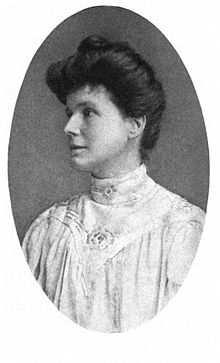May Sinclair
| May Sinclair | |
|---|---|

May Sinclair c. 1912
|
|
| Born |
24 August 1863 Rock Ferry, Cheshire |
| Died | 14 November 1946 Buckinghamshire, England |
| Occupation | Novelist and poet |
May Sinclair was the pseudonym of Mary Amelia St. Clair (24 August 1863 – 14 November 1946), a popular British writer who wrote about two dozen novels, short stories and poetry. She was an active suffragist, and member of the Woman Writers' Suffrage League. May Sinclair was also a significant critic in the area of modernist poetry and prose, and she is attributed with first using the term stream of consciousness in a literary context, when reviewing the first volumes of Dorothy Richardson's novel sequence Pilgrimage (1915–67), in The Egoist, April 1918.
She was born in Rock Ferry, Cheshire. Her father was a Liverpool shipowner, who went bankrupt, became an alcoholic, and died before she was an adult. Her mother was strict and religious; the family moved to Ilford on the edge of London. After one year of education at Cheltenham Ladies College, she acted as caretaker for her brothers, as four of the five, all older, were suffering from a fatal congenital heart disease.
From 1896 she wrote professionally, to support herself and her mother, who died in 1901. An active feminist, Sinclair treated a number of themes relating to the position of women, and marriage. She also wrote non-fiction based on studies of philosophy, particularly German idealism. Her works sold well in the United States.
Around 1913, at the Medico-Psychological Clinic in London, she became interested in psychoanalytic thought, and introduced matter related to Sigmund Freud's teaching in her novels. In 1914, she volunteered to join the Munro Ambulance Corps, a charitable organization (which included Lady Dorothie Feilding, Elsie Knocker and Mairi Chisholm) that aided wounded Belgian soldiers on the Western Front in Flanders. She was sent home after only a few weeks at the front; she wrote about the experience in both prose and poetry.
...
Wikipedia
